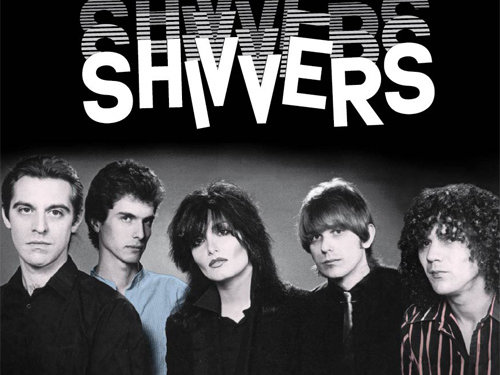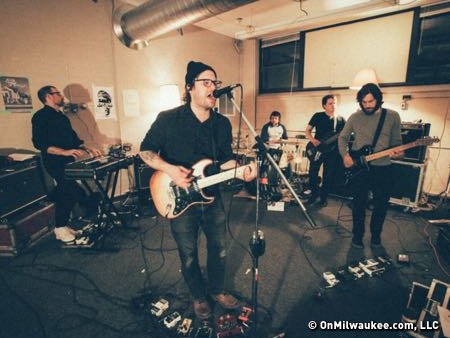Milwaukee has always had great bands, but perhaps no time was a fertile for the city’s rock and roll scene as the punk and post-punk era of the late 1970s and early ‘80s, when dozens of bands played original rock and roll of all stripes at The Starship on 5th Street and Zak’s on North Avenue.
But few of those bands managed to squeeze through the looking glass onto the national and international scene. One that seemed most primed to succeed on a bigger stage was The Shivvers, a melodic pop rock band that featured the distinctive voice of lead singer Jill Kossoris.
Part Blondie, part Raspberries, The Shivvers released a single called "Teen Line" back then, even drawing the attention of Raspberries' frontman Eric Carmen.
But the group’s long-playing power pop masterwork -- the eponymous "The Shivvers" would have to wait until 2014 to see vinyl release on New York’s Sing Sing Records (though the songs were first released on a 2006 Hyped2Death Records CD.
In 1993, Kossoris moved to Nashville, where she worked with The Mavericks -- among others -- and recorded a record, "Invisible," released in 2001.
We caught up with Kossoris to ask about the band -- which also included Scott Krueger, Jim Eannelli, Jim Richardson, Mike Pyle and the late Breck Burns -- and the renewed attention.
OnMilwaukee.com: Are you surprised by the interest in the band now?
Jill Kossoris: Yes. Initially we were very surprised. By the time Hyped2death Records contacted us in 2006 about releasing a Shivvers CD, I had grown so cynical I thought they were wasting their time. We were discussing the title of the CD and I said I didn't care if they called it "Lost Monkeys from Outer Space" nobody is going to be interested in it. Not that I didn't have faith in the band.
My reasoning was, if we couldn't stir up serious national or international interest when we were playing live, how on earth are we going to generate that interest now? Also the general consensus from the so called professionals was that we were great live, but our songs weren't ready. So it’s fantastic that the songs have taken on a life of their own.
OMC: What do you think about the Shivvers' music resonates with listeners all these years on?
JK: It's hard for me to be objective because I still feel close to the music and anything I say is going to make me sound like a braggart, but if I had to guess I'd say it's because people can tell when a rock 'n’ roll band is real, kicking in and playing with energy and passion, loving every minute of it and firing on all cylinders. Authenticity goes a long way in any art form, and that's more unusual than people think.
I also think people might be hungry for rock 'n’ roll music. There's a lot of "rock" music these days, but not a lot of rock 'n' roll music. By "rock 'n' roll" I mean music that swings, like Chuck Berry or The Rolling Stones. It makes you want to move. "Rock" music is more static ... you raise your fist in the air and scream but you don't dance. There's nothing wrong with that, it's just different. Now none of this really matters unless you have good songs, and it's been mentioned that our songs have a kind of timeless, classic feel to them, and if that’s true that's pretty cool because every band or songwriter that inspired us had that element.
OMC: There had been some national interest in the band at the time, why do you think it never really blew up back then?
JK: There was no internet and very few independent record labels, so we were at the mercy of management or a record label to take us to the next level. A band in itself could only do so much. Even The Beatles were seriously thinking of calling it a day before they met Brian Epstein. You have to have that business acumen behind you to understand the potential and follow through, and then you need perfect timing and a lot of good luck. There are no guarantees.
People assume that if you've really got something you will be "discovered," but I can tell you I've know many, many extremely talented people -- more talented than artists you hear on the radio every day -- who will never be heard by a wide audience because they just weren't in the right place at the right time with the right manager or producer.
OMC: Is it rewarding now to have that interest?
JK: It's bittersweet. It’s great to have something we created years ago still resonating with people and finding new fans, and it's beyond cool to be named as an influence by a new band along with Springsteen or Tom Petty.
On the other hand, it reaffirms that we did have something and I do wish we could have at least had a chance to see how truly creative or successful we could have been in another environment with some real support. You only get so many chances in life.
OMC: There weren't really too many other bands like the Shivvers in Milwaukee at the time, but did you feel like you had fellow travelers in other cities?
JK: Milwaukee had a lot of great bands during that era and beyond, and they are thankfully being rediscovered thanks to the internet, as well. Having played in some larger cities at the time, I was always shocked by the lack of a music "scene" per se, like we had in Milwaukee.
It really was a remarkable time and place. A lot of clubs to play, a lot of fans, a lot of enthusiasm, mutually supportive musicians influencing and competing with each other. Yes competing! It's not a bad word in my opinion. It’s a motivator and it raises the bar for everyone.
OMC: Have the CD and LP exhausted the Shivvers archives or is there a chance we will hear some more?
JK:
The new LP on SINGSING Records is completely remixed and REMASTERED (the sound quality is vastly improved) and it includes an additional song that wasn’t on the 2006 CD, so the archives are pretty well exhausted, but we are talking about recording a song we found on an old cassette from the era, and maybe a new song or two.
OMC: So you stay in touch with the surviving band members?
JK: We're still very close and we write and record together. Scott Krueger and Jim Richardson are in a band called The Aimless Blades and they've covered a couple of my songs, so they’re almost Shivvers songs!
As far as a reunion, we'd have to change "Teen Line" to "Life Line" (laughs). Seriously, we’ve had some very interesting and enticing offers to play in New York , Japan and London and believe me, there’s nothing I’d like to do more than travel and play live again, but I’ve been suffering from neuropathy -- which is basically serious nerve pain -- for the past 27 years and it’s very hard to manage.
On the upside, there’s always the possibility that someone will cover our songs or use them in film. It would be nice to actually have some financial reward as well as the great press after all these years.
Born in Brooklyn, N.Y., where he lived until he was 17, Bobby received his BA-Mass Communications from UWM in 1989 and has lived in Walker's Point, Bay View, Enderis Park, South Milwaukee and on the East Side.
He has published three non-fiction books in Italy – including one about an event in Milwaukee history, which was published in the U.S. in autumn 2010. Four more books, all about Milwaukee, have been published by The History Press.
With his most recent band, The Yell Leaders, Bobby released four LPs and had a songs featured in episodes of TV's "Party of Five" and "Dawson's Creek," and films in Japan, South America and the U.S. The Yell Leaders were named the best unsigned band in their region by VH-1 as part of its Rock Across America 1998 Tour. Most recently, the band contributed tracks to a UK vinyl/CD tribute to the Redskins and collaborated on a track with Italian novelist Enrico Remmert.
He's produced three installments of the "OMCD" series of local music compilations for OnMilwaukee.com and in 2007 produced a CD of Italian music and poetry.
In 2005, he was awarded the City of Asti's (Italy) Journalism Prize for his work focusing on that area. He has also won awards from the Milwaukee Press Club.
He has be heard on 88Nine Radio Milwaukee talking about his "Urban Spelunking" series of stories, in that station's most popular podcast.



%20copy.jpg)



